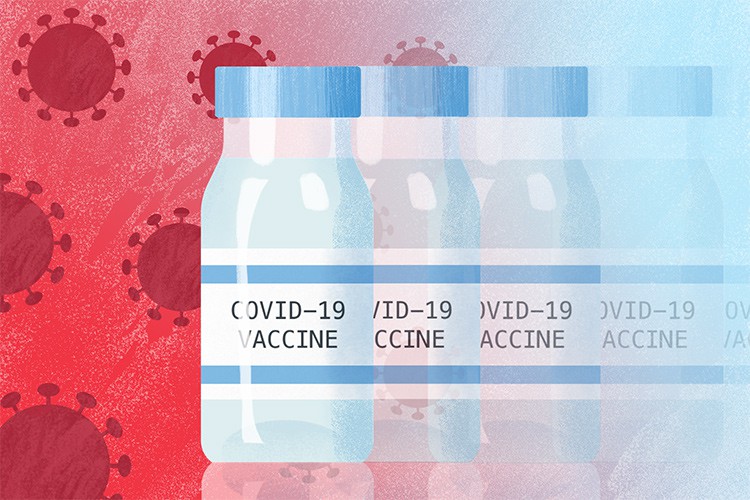
14 November 2022
At its peak, nearly 240,000 Covid vaccines were being administered daily. We’re down to about 5,000. Illustration: Lisa Nelson
Daily Covid vaccinations have more or less plateaued since July. At the peak of the vaccination drive, South Africa was administering up to 240,000 vaccine doses a day. But this number has dropped to just over 5,000 a day. Less than half of these are first doses and a third are booster shots.
The government still hasn’t reached its target of 67% adult vaccination, which it wanted to achieve by the end of 2021. Half of the adult population in South Africa is currently vaccinated. Among adults 60 years or older, nearly 73% have been fully vaccinated.
GroundUp visited the District Six Community Day Centre, a government clinic, in Cape Town. We asked for a Covid vaccine and were directed to a small room on the first floor, where one of us waited over 1.5 hours to get a vaccine (though two of us were vaccinated considerably quicker - about 30 minutes). This wasn’t because there was a long queue.
The nurse administering the vaccines was busy treating patients elsewhere in the clinic. The person logging the vaccines on the computer system told GroundUp that on average, 12 people a day come to the clinic for vaccines.
GroundUp visited a Clicks store in Cape Town where, three months ago, vaccines were still being administered. But they no longer do Covid vaccines.
The government’s dedicated Coronavirus website has a list of “active vaccination sites”, many of which are no longer active, and the “Find My Jab” page has completely different information.
Meanwhile, people are still getting ill from the virus. About 2,000 new cases are reported each week, but according to the National Institute for Communicable Diseases (NICD) only 16% of cases are being detected. Testing sites are also few and far between.
Professor Glenda Gray says that the vaccine has done a good job at reducing deaths, serious illness and hospitalisations. Official daily deaths and hospitalisation rates are low in relation to previous waves. In the past four weeks, 125 deaths from Covid-19 were reported.
The real number of deaths is likely much more than this. A weekly report published by the Medical Research Council and the University of Cape Town calculates the number of excess deaths – the deaths above the historical average before Covid: there have been close to 50,000 excess deaths so far this year. While in earlier waves the researchers were able to estimate that 85% to 95% of these excess deaths were due to Covid, the changing nature of the epidemic has made it much harder to estimate how many of this year’s excess deaths are due to Covid.
More than 85% of Covid infections in the country are from the Omicron BA.5 variant, which is widespread and infectious but usually causes very mild illness.
To prevent serious illness and death, getting the vaccine and booster shots are still recommended. Gray says that it is especially important for immunocompromised people, such as people living with HIV, to get vaccinated.
“Sadly, the virus has done a far better job of generating immunity than our government, which continues to be maddeningly slow at getting the vaccine out,” says Professor Francois Venter, infectious diseases clinician and head of Ezintsha at Wits University.
Although being infected by and recovering from the virus does provide a level of immunity, getting a vaccine still greatly improves one’s protection against the virus.
“I think we were all hoping once we had immunity from either infection or a vaccine or two, it would be enough. But from what we are seeing internationally, new waves of Covid, while not killing people in the numbers we saw in 2020 and 2021, are still making people very sick,” Venter says.
Dr Nicholas Crisp, Deputy Director-General of the National Department of Health, is the coordinator of the national vaccination drive. He agrees the current status of the vaccination drive is “very disappointing”.
He says the vaccination program is being integrated into primary health care, targeting areas geographically where communities or segments of a community are not vaccinated.
To monitor and manage the pandemic, Crisp says the government is continuing with daily testing, gene sequencing and wastewater sampling. Crisp says that the government is preparing for the future of Covid as well as other potential pandemics.
Future variants of the virus could be more dangerous. “As long as there is transmission, there is going to be mutation,” Gray told GroundUp. How the virus mutates in the future is yet to be seen.
In the US, new bivalent vaccines designed to target the Omicron variant are already available. But, Gray says, there is not yet sufficient evidence that these work better than the current vaccines.
According to Crisp, the government is not considering any new vaccines. “We are not buying vaccines this year and may not buy vaccines next year,” he says.
South Africa still has 8 million doses of the Pfizer vaccine and 10 million doses of the Johnson and Johnson vaccine. He says pediatric Pfizer vaccines will be purchased with some of the credit that South Africa has with the Covax facility. These will be given to children who are immunocompromised.